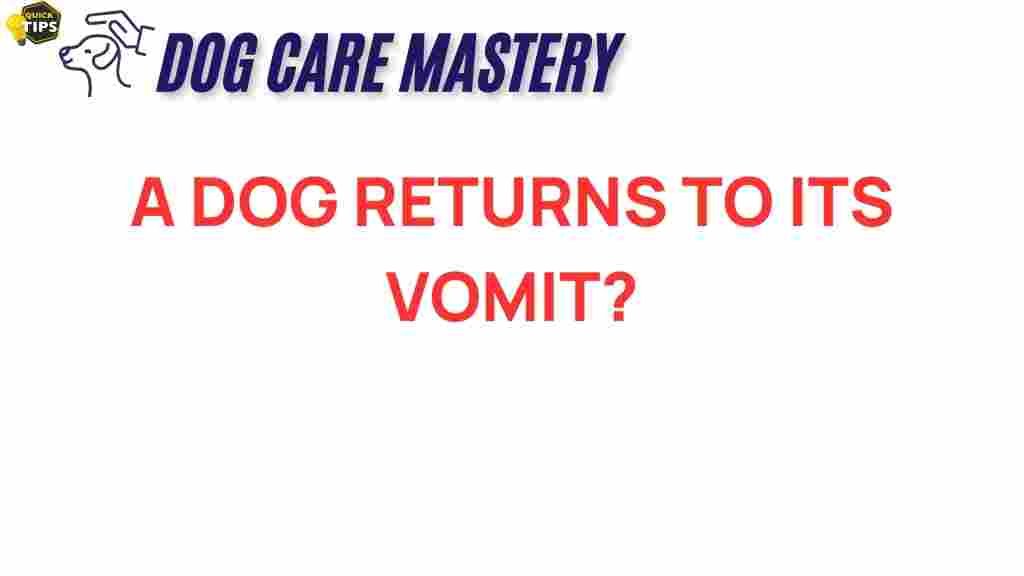Understanding Dog Behavior: Why Do Dogs Eat Their Own Vomit?
Dogs are known for their quirky and sometimes baffling behaviors. One of the most perplexing actions that many dog owners encounter is when their furry friends consume their own vomit. This behavior can be shocking and unsettling, leading many pet owners to wonder, “Why do dogs eat their own vomit?” In this article, we will explore the various reasons behind this bizarre dog behavior, providing insights to help you understand your canine companion better.
What is Vomiting in Dogs?
Before delving into the reasons why dogs may eat their own vomit, it’s essential to understand what vomiting is. Vomiting is the forceful expulsion of stomach contents through the mouth. It can occur for various reasons, including:
- Dietary indiscretion (eating something they shouldn’t)
- Food allergies or intolerances
- Infections or illnesses
- Stress or anxiety
- Gastrointestinal obstruction
Once a dog has vomited, the question remains: why do they sometimes go back to consume what they have expelled?
Reasons Behind This Dog Behavior
There are several theories regarding why dogs eat their own vomit, and these explanations can vary based on the individual dog’s personality and circumstances. Here are some of the most common reasons:
1. Natural Instincts
Dogs are descendants of wolves, and many of their behaviors are rooted in instinct. In the wild, a dog might consume its vomit to avoid attracting predators. This instinctual behavior can be traced back to survival tactics learned from their ancestors.
2. Nutritional Deficiencies
Sometimes, dogs may consume their vomit because they are lacking certain nutrients in their diet. Vomit can contain undigested food that still holds nutritional value, prompting the dog to eat it. If you notice your dog frequently vomiting and eating it again, it might be time to evaluate their diet.
3. Cleaning Behavior
Dogs are known for their cleaning habits, which can translate to removing any evidence of sickness. By consuming their vomit, they may instinctively feel they are cleaning their environment and themselves.
4. Curiosity and Exploration
Dogs are naturally curious creatures. If a dog vomits, they might be intrigued by the smell and texture of the vomit, leading them to investigate further. This exploratory behavior is common in puppies who are still learning about their world.
5. Behavioral Issues
In some cases, eating vomit can be linked to behavioral issues such as anxiety or stress. Dogs that experience separation anxiety or other forms of stress may engage in compulsive behaviors, which can include consuming vomit.
Step-by-Step Process: What to Do If Your Dog Eats Their Vomit
If you observe your dog eating their vomit, it’s important to take a few steps to ensure their well-being:
- Stay Calm: Reacting with shock or disgust can increase your dog’s anxiety. Stay calm to avoid escalating the situation.
- Evaluate the Situation: Determine why your dog might have vomited in the first place. Look for signs of illness, changes in diet, or stressors in their environment.
- Consult Your Veterinarian: If your dog vomits frequently or shows signs of distress, consult with your veterinarian to rule out any underlying health issues.
- Monitor Their Diet: Ensure your dog is eating a balanced diet. You may want to discuss dietary options with your vet if nutritional deficiencies are suspected.
- Provide a Calm Environment: If stress is a factor, create a soothing environment for your dog. This might include a quiet space, calming music, or engaging in gentle play.
Troubleshooting Tips for Dog Owners
If your dog continues to eat their vomit, consider the following troubleshooting tips:
- Feeding Schedule: Establish a regular feeding schedule to prevent hunger-induced vomiting.
- Limit Access: After your dog vomits, try to limit their access to the area until you can clean it up.
- Behavioral Training: If the behavior is compulsive, consider consulting a professional dog trainer or behaviorist.
- Stress Reduction: Implement stress-reduction techniques, such as regular exercise, mental stimulation, and socialization.
- Vet Check-ups: Regular vet visits can help catch any health issues early, ensuring your dog remains healthy.
Conclusion: Understanding Your Dog’s Behavior
In conclusion, while the behavior of dogs eating their own vomit can be puzzling and even off-putting, it often stems from natural instincts, curiosity, or dietary needs. Understanding the reasons behind this behavior can help you respond appropriately and take steps to mitigate it. If your dog’s vomiting becomes frequent or concerning, always consult with a veterinarian for guidance. By paying attention to your dog’s behavior and providing a supportive environment, you can ensure their health and happiness.
For more information about dog behavior and health, check out this comprehensive guide. And if you’re seeking additional support or resources on dog training, visit our training page!
This article is in the category Behavior and created by dogcaremastery Team
